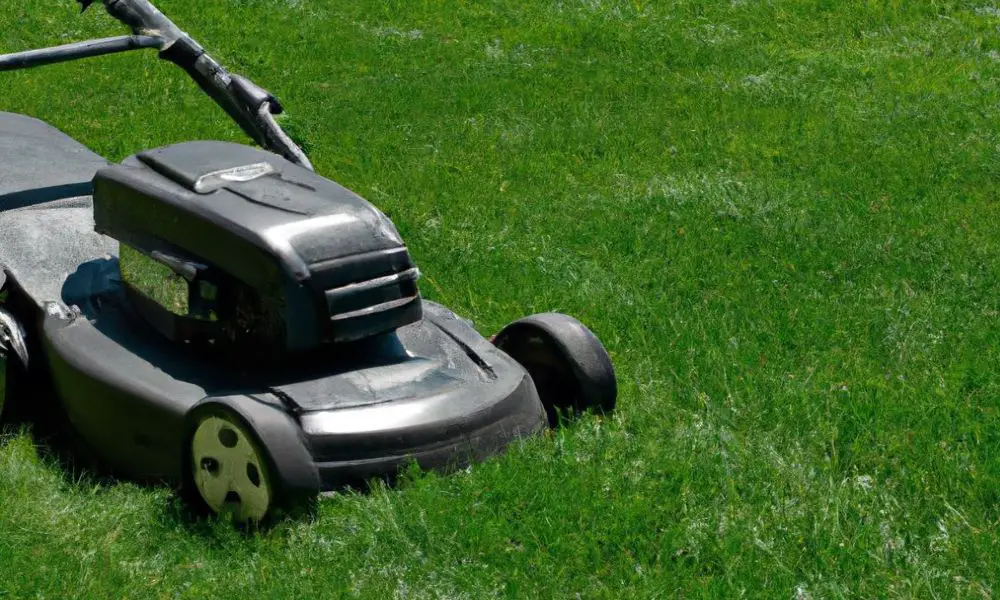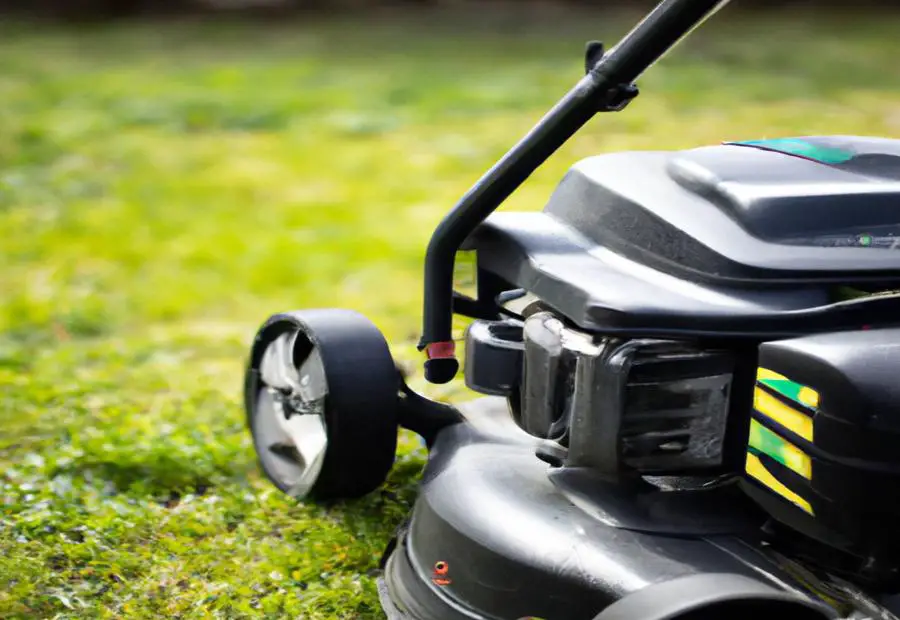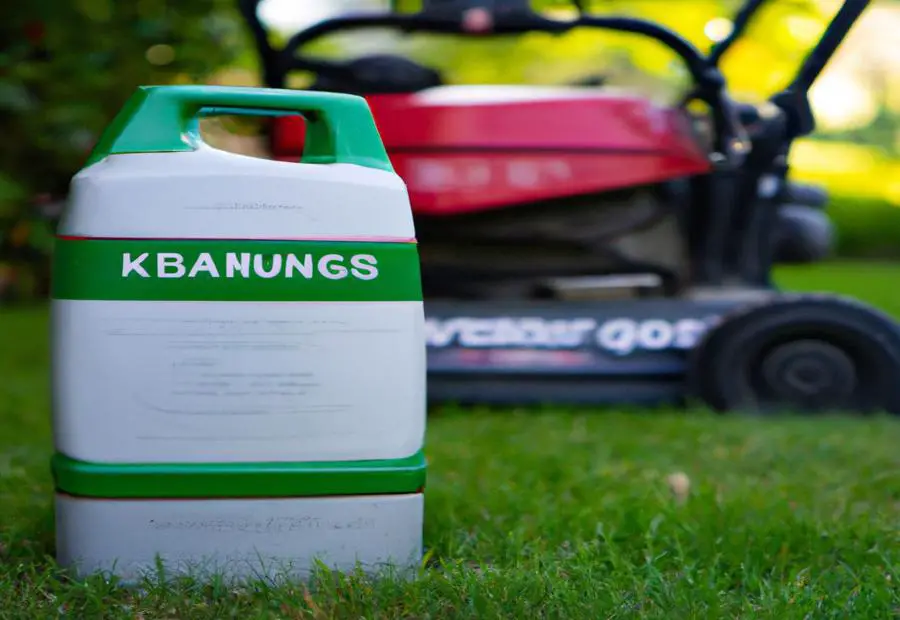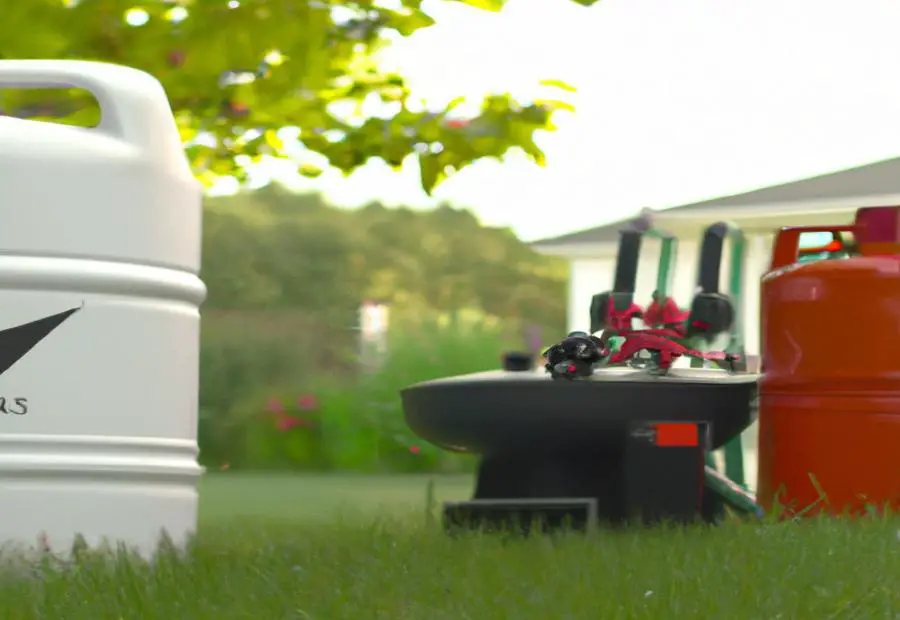GardenerHeaven.com is reader-supported. When you buy through links on our site, we may earn an affiliate commission.

Using the right fuel for your lawn mower is crucial for optimum performance. In this section, we will explore the importance of selecting the correct gas type for your mower. Discover the impact of using the right fuel on your mower’s efficiency, longevity, and overall maintenance. With valuable insights from experts and supported by relevant data, we will equip you with the knowledge needed to make informed decisions and keep your lawn mower running smoothly.
Importance of using the right fuel for lawn mowers

Photo Credits: Gardenerheaven.Com by Elijah Flores
Choosing the correct fuel for your lawn mower is essential! Your fuel selection has a great effect on its performance and lifespan. Knowing the engine’s needs is a must and selecting the most suitable fuel is a must!
Ethanol, found in gas, can be bad news for small engines like on lawn mowers. Ethanol has hygroscopic properties, meaning it attracts & absorbs moisture from the air. This moisture can cause corrosion and result in various engine problems such as clogged carburetors & fuel lines. Plus, ethanol-blended fuels can also break down seals, gaskets, & other engine components with time.
For the best lawn mower performance, there are several tips to consider. Adding a fuel stabilizer to prevent water accumulation in the tank is recommended. This helps maintain the fuel’s quality and avoid issues related to ethanol. Another tip – select gasoline with the lowest ethanol content. The lower the ethanol, the lesser the negative impact on the engine. Also, precision-engineered fuels without any ethanol content are available.
For the best results, use clean and fresh unleaded gasoline with a minimum octane rating of 87 AKI (anti-knock index). Considering acceptable ethanol content in gasoline is necessary to avoid potential problems caused by excessive ethanol exposure in small engines. Those in high-altitude climates should select fuels specifically designed for them as they contain adjustments for decreased oxygen levels.
Different engines require different fuel types. Two-stroke cycle engines usually require a mix of oil & gas, while four-stroke cycle engines usually run on pure gasoline. Be sure to know the fuel requirements of your engine to prevent damage and ensure optimal performance.
Proper storage and maintenance of lawn mower gas is important for its usability over time. Use a fuel stabilizer to keep it fresh. Follow proper storage techniques for equipment, like keeping it in a dry & well-ventilated area. Draining untreated fuel from the small engine before extended periods of non-use can prevent issues caused by old fuel. Buy fuel in appropriate quantities to reduce the risk of using old or degraded gasoline.
For further information on fuel types and recommendations, contact professionals. Get specialized guidance based on your specific needs and circumstances. They can answer your doubts and make sure you have all the info about the right gas for your lawn mower.
Ethanol: Turning your lawn mower into a cocktail shaker since…
Understanding the impact of ethanol on fuels

Photo Credits: Gardenerheaven.Com by Bobby Lee
Ethanol in fuels can have a significant impact on the performance of your lawn mower. In this section, we will explore the effects of ethanol on small engines and the common problems it can cause in lawn mower engines. Understanding these impacts is crucial for choosing the right gas that ensures optimal functioning and longevity of your equipment. So, let’s dive in and examine the role of ethanol in fuels and its potential consequences for your lawn mower’s engine.
Explanation of ethanol and its effects on small engines
Ethanol is a type of alcohol which is often added to gasoline. However, it can be damaging to small engines like those in lawn mowers. It can absorb moisture from the air, forming water droplets in the fuel. This can cause corrosion and damage parts of the engine.
Ethanol has a lower energy content than gasoline, reducing engine performance. It is also a solvent, which can dissolve rubber gaskets and seals. This can lead to leaks and other problems.
Ethanol-enriched fuel can also make cold weather starts more difficult. It has a higher vapor pressure than gasoline and is prone to evaporating when it’s cold. This can make the fuel harder to ignite.
Owners of lawn mowers should be aware of these issues. Knowing the impact of ethanol can help them make the right choices to maintain their engine’s performance and longevity.
Problems caused by ethanol in lawn mower engines
Ethanol in fuels can be troublesome for lawn mower engines. Ethanol is a type of alcohol commonly found in gasoline. But, it can cause damage to small engines like those found in lawn mowers.
One issue from ethanol is corrosion and damage to engine components. It absorbs moisture from the air, creating water droplets in the fuel tank and lines. This water mixes with ethanol to form corrosive acids which eat away at the metal inside the engine.
Another issue is the breakdown of rubber and plastic components. This includes seals, hoses, gaskets, and diaphragms in carburetors. After prolonged exposure, these materials can become brittle and lead to leaks or other performance issues.
Additionally, ethanol has lower energy content than gasoline. This can mean reduced power output and efficiency. It can affect the lawn mower’s performance and may cause difficulty starting or reduced cutting power.
It is important to know these ethanol-related issues and take preventive measures. Choose fuels with lower ethanol or precision-engineered fuels without ethanol. Plus, use fuel stabilizers, drain untreated fuel, and buy fuel in proper amounts for freshness. Avoid fuel mistakes and keep your lawn mower running smoothly!
Tips for selecting the right fuel for your lawn mower

Photo Credits: Gardenerheaven.Com by Gerald Roberts
Selecting the right fuel for your lawn mower is crucial for optimal performance. In this section, we’ll explore key tips to help you make the best choice. From adding a fuel stabilizer to prevent water accumulation in the tank, to opting for fuel with low ethanol content, and even considering precision-engineered ethanol-free options, we’ll equip you with the knowledge to keep your lawn mower running smoothly and efficiently.
Adding a fuel stabilizer to prevent water in the fuel tank
John was always careful with his lawn mower maintenance. But one summer he skipped adding a fuel stabilizer. This caused water to build up in the fuel tank before winter. In spring, John had trouble starting his mower. He also noticed rust in the tank! He was worried about costly repairs. So, John learned his lesson and now he always adds a fuel stabilizer. No more issues since then, and his lawn looks amazing!
Choosing fuel with the lowest ethanol content possible
Reports show that ethanol in fuel can harm small engines, such as lawnmowers. It can cause carburetor issues, fuel line damage, and engine performance problems. So it’s important to choose fuel with low ethanol content.
A 3-Step Guide:
- Read labels and aim for the low ethanol content.
- Look for specialized products made for small engines.
- Use a fuel stabilizer to prevent water from accumulating.
Besides selecting fuel with low alcohol levels, it’s essential to follow other recommendations, like using unleaded gasoline with the right octane level. Specialized fuels with low/no ethanol content can help minimize potential engine damage and improve equipment performance.
The option of using precision-engineered fuel without ethanol
Precision-engineered fuel sans ethanol supplies reliable energy for lawn mowers. This prevents engine damage and lengthens the engine’s lifespan. Plus, it promotes improved fuel efficiency and lowered emissions, creating a cleaner environment.
No more fretting over ethanol content! This gives lawn mower owners assurance and allows them to concentrate on their lawn care.
The experts or manufacturers specializing in small engine equipment provide helpful advice on precision-engineered fuel without ethanol. They can help you select the perfect fuel for your lawn mower.
So don’t give your mower a “bad hair day” by using the wrong fuel – choose wisely!
Fuel recommendations for lawn mowers and small engines

Photo Credits: Gardenerheaven.Com by Noah Wright
When it comes to fueling your lawn mower or small engine, it’s crucial to make the right choices. In this section, we’ll discuss the essential fuel recommendations that ensure optimal performance and longevity. From using clean, fresh, unleaded gasoline with a minimum of 87 octane/87 AKI to considering the ethanol content in gasoline, we’ll cover all the key factors. Additionally, we’ll explore the considerations for high-altitude climates and provide specific fuel recommendations for 2-stroke and 4-stroke cycle engines.
Using clean, fresh, unleaded gasoline with a minimum of 87 octane/87 AKI
Clean, fresh, unleaded gasoline with a minimum of 87 octane/87 AKI is key for lawn mowers and small engines. This fuel has fewer impurities and contaminants, for better power output and fewer knocks or pings. It also reduces emissions, protecting the environment. The freshness of the fuel is important too, as old petrol can lead to starting issues, rough running, and bad performance.
Other factors should be taken into account when picking fuel. A fuel stabilizer for preventing water in the fuel tank is recommended. Low ethanol content is best, as ethanol can corrode and damage rubber components, and cause carburetion problems. Precision-engineered fuel without ethanol is an option to avoid these concerns.
The acceptable ethanol content in gasoline
Understanding the acceptable ethanol content in gasoline for lawn mowers is key. Ethanol is an alcohol that can be blended with gas and it can cause issues with small engines like those found in lawn mowers.
Ethanol can absorb water from the air, leading to rust and corrosion in the fuel system. This can lead to engine damage and decreased performance.
It’s best to choose gasoline with the lowest ethanol content possible. Lower ethanol content reduces the risk of fuel system damage. Alternatively, precision-engineered fuel without any ethanol can offer optimal performance and protection.
Remember: always check fuel labels and specs before buying gas for your mower. Look for 10% or less ethanol content, or consider precision-engineered fuel without ethanol.
Consideration for high altitude climates
At higher elevations, air thins, causing unique challenges for lawn mower engines. This affects the fuel-air mixture and combustion process, resulting in decreased engine performance and potential damage. To avoid these issues, consider the following:
- Adjust carburetor settings.
- Use lower ethanol content fuels.
- Pick a higher octane-rating gasoline.
- Perform regular maintenance and cleaning.
- Consult experts.
These recommendations can help optimize engine performance and prevent potential problems.
An example of this is when a homeowner moved to a high-altitude spot and had trouble starting the lawn mower. After amending the carburetor settings and using higher octane fuel, the machine worked better, enabling efficient lawn care. This emphasizes the importance of altitude-specific factors when selecting the right fuel for lawn mowers.
Fuel recommendations for 2-stroke and 4-stroke cycle engines
For optimal performance and longevity of small engines, it’s essential to select the correct fuel. It’s recommended to use clean, fresh unleaded gasoline with a minimum of 87 octane/87 AKI. Low ethanol content in the fuel is best, as high levels can cause corrosion, gum build-up, and harm rubber components in the fuel system.
In high altitudes, adjusting the fuel-air mixture ratio may be necessary. Consult manufacturer guidelines or seek expert advice for the right fuel-air ratio.
For 2-stroke cycle engines, follow manufacturer instructions on oil-to-gasoline mixtures. An incorrect mixture can damage the engine or reduce performance. Use mixed fuels or premixed fuels designed for 2-stroke engines.
For 4-stroke cycle engines, use fuels that meet manufacturer specifications regarding octane rating and ethanol content. This will help prevent issues caused by incorrect fuels.
Choosing the right fuel is essential for maintaining engine performance and longevity. To make an informed decision, consult experts or manufacturer guidelines. Don’t miss out on this key part of lawn mower maintenance!
Proper storage and maintenance of lawn mower gas

Photo Credits: Gardenerheaven.Com by Timothy Green
Proper storage and maintenance of lawn mower gas is essential for optimal performance. Discover how using a fuel stabilizer, employing proper storage techniques, draining untreated fuel, and buying fuel in appropriate quantities can keep your lawn mower gas fresh and ensure a smooth running machine.
Using fuel stabilizer to keep the gas fresh
Fuel stabilizer is a must-have for keeping gas fresh and quality in small engines and lawn mowers. It stops degradation and varnish from forming, so your fuel is top-notch for engine performance.
To get the best out of a fuel stabilizer:
-
Pick the right one! Look for a high-quality stabilizer made for small engines. Check the label to make sure it works with ethanol fuel.
-
Fill the tank with stabilizer: Before filling the tank with gas, add the right amount of stabilizer following the manufacturer’s instructions. Do this each time you refuel.
-
Start the engine: After adding the stabilizer, turn on the engine and let it run for a few minutes. This lets the treated fuel go through the engine, protecting it from damage caused by old or degraded gas.
Using a fuel stabilizer lengthens the shelf life of gas and keeps it fresh for longer. Frequent use of a great stabilizer stops gum buildup, clogging of carburetors, and rough engine performance.
Remember, not all fuel stabilizers are the same. Some may have extra benefits like corrosion protection or better storage security. To get the best for your needs, ask industry professionals or read the manufacturer’s directions.
Store your equipment properly so it doesn’t end up a rusty lawn decoration.
Proper storage techniques for equipment
- Clean and prepare the lawn mower for storage with no debris, grass clippings, or dirt on the exterior. This will stop corrosion and keep the mower in good condition.
- Disconnect the spark plug wire. This is essential for safety and will help save battery life.
- Store the mower in a dry place like a garage or shed. Cover it with a tarp or protective cover to stop dust, debris, and pests.
- Do regular maintenance before storing. This includes oil levels, air filters, blade sharpening, and lubricating parts.
- A customer shared their experience with proper storage. After not following storage techniques, they found their lawn mower not working due to clogged fuel. They had to pay to repair the engine. This shows how important it is to follow proper storage techniques to avoid costly repairs and keep performance optimal.
- Draining untreated fuel from the tank will keep the engine clean.
Draining untreated fuel from the small engine
- Ensure the engine is cool and disconnect any spark plugs or ignition wires to prevent accidental starting.
- Locate the fuel valve or cap, usually near the carburetor or fuel tank.
- Place a container or storage tank below the carburetor or fuel line to catch any spilled fuel.
- Open the valve or remove the cap, allowing fuel to flow into the container.
- Replace and tighten the valve or cap securely.
- Dispose of fuel according to local regulations.
Perform regular maintenance, like draining fuel, to prevent varnish buildup and other problems caused by stale gasoline.
Pro Tip: If you won’t be using your lawn mower for a while, let it idle until it runs out of fuel. This ensures no untreated fuel is left behind and minimizes potential problems when restarting.
Purchasing fuel in appropriate quantities for freshness
Want to make the right decision when buying fuel for your lawn mower? Follow these 4 steps:
- Pick the right one – use clean, fresh, unleaded gasoline with an octane rating of 87 or higher. This helps your engine run smoothly and reduces the risk of problems.
- Check the ethanol content – try to select fuel with the lowest ethanol content possible. This helps protect your engine from corrosion, clogged fuel lines, and other damage.
- Consider precision-engineered fuel – there’s an option to avoid ethanol-related issues: precision-engineered fuel specifically designed for small engines. It won’t contain any ethanol and offers better protection and performance.
- Buy in small quantities for freshness – to keep the fuel fresh, purchase smaller amounts. This stops gas from sitting in the tank for too long and helps you get the best performance from your engine.
Need help? Contact experts in small engine equipment. Get advice tailored to your needs – and avoid making bad gas choices as you do with your life decisions!
Contacting experts for further information on fuel types and recommendations

Photo Credits: Gardenerheaven.Com by Mason Brown
Experts are a great source of info and tips on the best gas for your lawn mower. They can provide valuable insights into the pros and cons of the various fuel options. Consulting them is key to choosing the right gas.
They can suggest the optimal octane rating for your engine type, performance needs, and environmental concerns. Plus, they can educate you on why ethanol-free fuel is best to avoid clogs and damage.
Furthermore, they can explain the risks of using the wrong fuel. It could cause engine damage, decreased performance, and maintenance fees. Experts will also tell you how to store fuel and keep it from going bad.
Conclusion

Photo Credits: Gardenerheaven.Com by Andrew Torres
It’s vital to select the right gasoline for your lawn mower. To ensure efficient combustion, reduce emissions, and avoid damage to the engine, pick a gas that meets your machine’s exact requirements.
First, check the gas’s octane rating. Usually, mowers need a regular octane gasoline with an octane rating of 87. But, higher-performance mowers may need a higher rating to avoid engine knocking. Read your mower’s user manual or contact the manufacturer to learn the recommended octane rating.
Also, go for ethanol-free gasoline. Ethanol can draw in moisture and cause fuel degradation, which may damage engine components. Choose gasoline labeled as “ethanol-free” or “up to 10% ethanol.”
Freshness is key, too. Stale gas can block the fuel system and harm engine performance. It’s best to use fresh gas and not store it for more than 30 days. Fuel stabilizers can help extend the shelf life of gasoline and stop any potential issues.
Remember, using the wrong gas might void your mower’s warranty. Always stick to the manufacturer’s recommendations and guidelines for the best performance and life of your equipment. By taking proper care of your lawn mower’s fuel needs, you’ll have a well-maintained and efficient machine.
Some Facts About Choosing the Right Gas for Your Lawn Mower: A Complete Guide:
- ✅ Ethanol fuels may not be the best choice for small engines like lawn mowers. (Source: Team Research)
- ✅ Ethanol burns hotter in smaller engines and can cause damage to engine parts. (Source: Team Research)
- ✅ Fuels containing ethanol can cause water to settle at the bottom of the gas tank, leading to corroding and clogging of the fuel system. (Source: Team Research)
- ✅ It is recommended to use fuel stabilizer at the beginning and end of each season to prevent water in the fuel tank. (Source: Team Research)
- ✅ The lowest ethanol content possible should be chosen, and precision-engineered fuel without any ethanol is also an option. (Source: Team Research)
FAQs about Choosing The Right Gas For Your Lawn Mower: A Complete Guide
Question 1: Can I use fuel containing ethanol in my lawn mower or small engine?
Answer: It is not recommended to use fuels containing ethanol in small engines like lawn mowers. Ethanol burns hotter in smaller engines and can cause damage to engine parts. Ethanol also attracts moisture, leading to phase separation and potential fuel system issues.
Question 2: What is the best fuel type for lawn mowers and small engines?
Answer: The best fuel type for lawn mowers and small engines is clean, fresh, unleaded gasoline with a minimum of 87 octane/87 AKI. Gasoline with up to 10% ethanol or up to 15% MTBE is acceptable, but gasoline with 15% ethanol (E15) is not recommended for use in small engines.
Question 3: How can I ensure peak performance of my outdoor power equipment?
Answer: To ensure peak performance of your outdoor power equipment, it is recommended to choose fuel with the lowest ethanol content possible. Most gas stations sell E-10 gas, which contains 10% ethanol and can be used for outdoor power equipment. Another option is to use precision-engineered fuel that does not contain any ethanol, specifically designed for 2-cycle and 4-cycle engines.
Question 4: Can using the wrong fuel damage my small engine or void the warranty?
Answer: Yes, using unapproved fuel types or modifying the engine to run on alternative fuels can cause damage to the small engine and void the warranty. It is important to follow the manufacturer’s recommendations for fuel selection.
Question 5: How do I store gasoline for my lawn mower or small engine?
Answer: To store gasoline for your lawn mower or small engine, it is recommended to use fuel stabilizer in the storage container. Also, purchase fuel in quantities that can be used within 30 days to maintain freshness and volatility tailored to the season. Storing gasoline for more than 30 days can cause it to become stale and potentially damage the engine.
Question 6: What happens if the gasoline in my small engine has not been treated with a fuel stabilizer?
Answer: If the gasoline in your small engine has not been treated with a fuel stabilizer, it is recommended to drain it into an approved container. Using untreated gasoline can lead to fuel degradation, potentially causing starting issues and costly repairs.




